Article
Obesity Found to Influence Efficacy of JAKi Inhibitor Therapy
Author(s):
Obesity in patients with rheumatoid arthritis has been found to influence the effectiveness of JAKi inhibitor treatments.

Obesity is a medical concern on its own, but in relation to rheumatoid arthritis (RA), it has been suspected to be even more so. However, while literature has previously described obesity’s influence on treatment response of tumor necrosis factor inhibitors in patients with RA, concrete data on Janus kinase inhibitors (JAKi) is lacking.
At the 2018 ACR/ARHP Annual Meeting, October 19-24, 2018, in Chicago, Illinois, though, investigators presented data from a study evaluating the impact of obesity on the achievement of low disease activity (LDA = DAS28-ESR<3.2) in RA patients treated with JAKi, indicating an influence on treatment efficacy.
The study included reported data from RABBIT (Rheumatoid Arthritis: Observation of biologic therapy) patients who started either baricitinib or tofacitinib between March 2017 and April 2018.
RA patients are enrolled in the he German prospective longitudinal observational cohort RABBIT when they begin a therapy with biologics, biosimilars, JAKi or new csDMARDs.
The baseline was considered the time of JAKi treatment started.
According to their BMI, patients were stratified into normal weight (<25 mg/m2), overweight (25 — <30 mg/m2) and obese (≥30 mg/m2) categories. Data regarding treatment responses from patients with a baseline DAS28≥3.2 and available follow-up information within the first 6 months was collected.
In order to analyze the impact of BMI categories on LDA achievement (versus non-response or stopping JAKi treatment), adjusted logistic regression models were applied.
Among the patients analyzed, a total of N=539 patients started a treatment with JAKi, with 66% (n=355) receiving baricitinib and 34% (n=184) receiving tofacitinib.
Compared to normal weight patients, obese patients were less often female, but obese patients were not noted to be considerably older.
Furthermore, the team found obese patients presented with higher values for DAS28 and fatigue in addition to having worse physical function at baseline, despite lower frequency of seropositivity.
Recommended standards doses of JAKi were administered to most of the patients.
Upon analyzing the results, investigators found LDA was reached within the first 6 months of treatment by 42% of patients with normal weight and 41% with overweight. However, only 19% of obese patients reached LDA within the first 6 months off treatment.
Additionally, a high negative impact of obesity on the achievement of LDA compared to normal weight was revealed by the regression model. The chance for LDA was increased by a better physical function at baseline and no prior biologic treatment.
An impact of JAKi dosage or mono-/ combination therapy on the response to treatment was not found.
Based on the results, the study authors concluded that a negative impact on the achievement of LDA in RA patients treated with JAKi was due to patients being obese, not overweight.
Looking forward, authors noted that in order to investigate factors that affect treatment response in obese patients, further studies are needed.
Click here to sign up for more MD Magazine content and updates.Related Coverage >>>
Malignancy & Serious Infections with JAK Inhibitors for RA Treatment
Patients Who Introduce Moderate-to-Vigorous Intensity Walking May Avoid Total Knee Replacement
Reference:
Meißner Y, Baganz L, Schneider M, Schwarze I, Feuchtenberger M, Zink A, Strangfeld A. Baricitinib and Tofacitinib in Real Life — Does Obesity Impact Response to Janus Kinase Inhibitor Therapy in Rheumatoid Arthritis? [abstract]. Arthritis Rheumatol.2018; 70 (suppl 10). https://acrabstracts.org/abstract/baricitinib-and-tofacitinib-in-real-life-does-obesity-impact-response-to-janus-kinase-inhibitor-therapy-in-rheumatoid-arthritis/. Accessed October 22, 2018.





